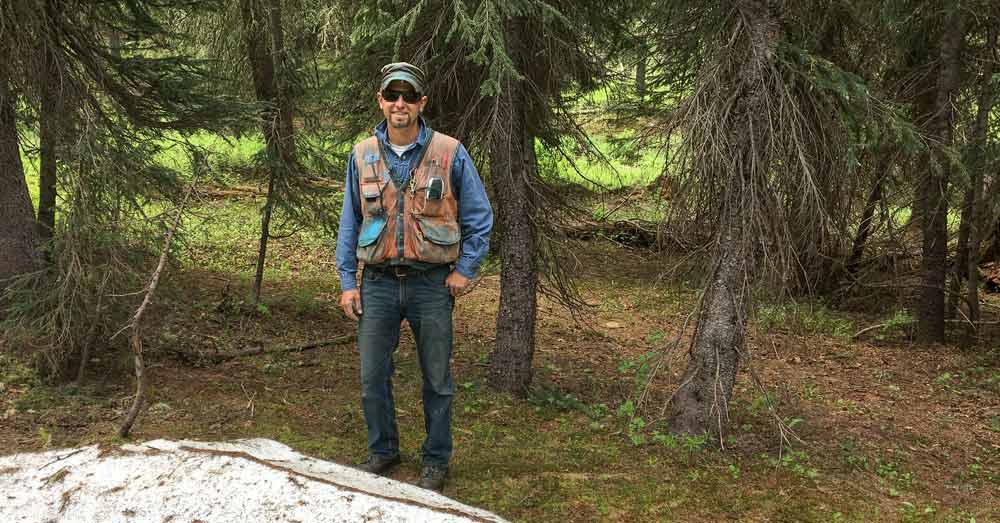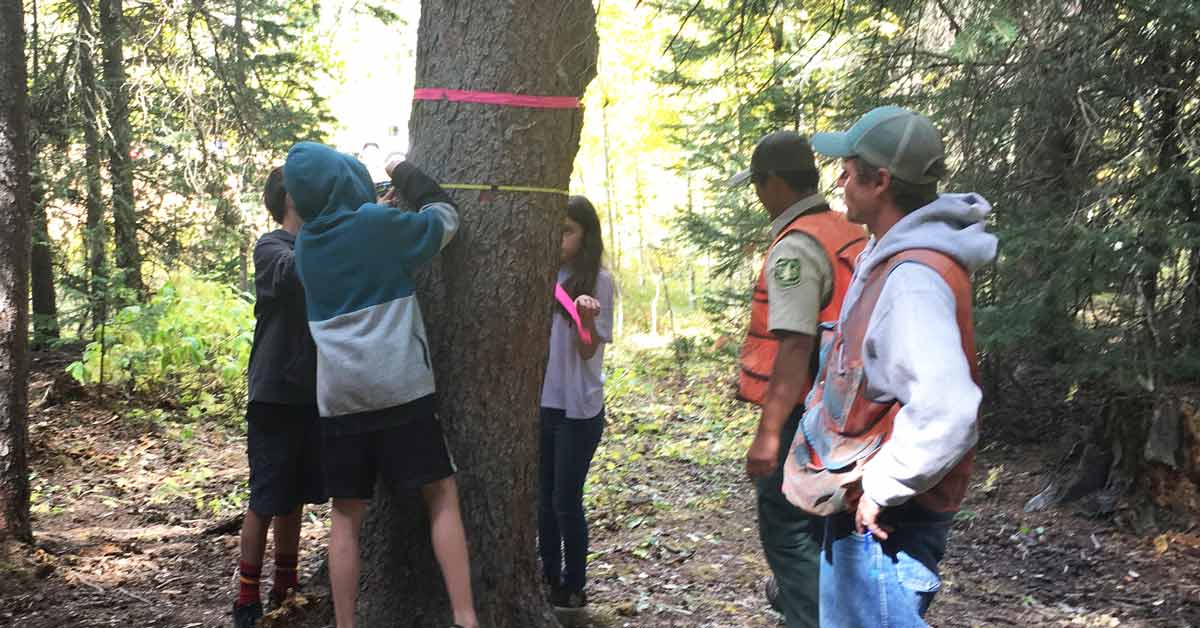


Select one of the options below:
Build the skills to make more strategic, data-driven, and science-based decisions as a practicing forestry professional.
The online Graduate Certificate in Advanced Silviculture provides forestry professionals with current, research-based knowledge and hones the skills you need to make strategic, science-based decisions within an adaptive management context. Designed specifically for practicing foresters, this online certificate will prepare you with the in-depth knowledge, methods, theories, and tactics to identify, compare, and apply advanced ecological concepts to diverse forest ecosystems.
Managing forest systems effectively requires a diverse set of skills. Learn to develop, implement, and evaluate silvicultural solutions to help both forests and communities adapt to a changing climate. After completing the program, graduates will be able to:
Forestry can be generally defined as the practice and science of managing forests. Silviculture is an extension of the forestry discipline focused on sustainably managing the structure and growth processes of forested areas via science-based methods. Silviculture works to control tree and vegetation density, replenish unproductive areas with new trees, monitor forest ecosystems, protect existing trees from invasive insects, diseases, and other destructive agents, and harvests trees when needed. Foresters with in-depth knowledge of silviculture are well-equipped to take on land management projects with greater levels of complexity, scale, and responsibility.
This certificate program, developed through online coursework by silviculture experts, is ideal for professionals working in a variety of forest management and conservation roles. It is tailored to suit individuals holding the following job titles:
These roles require a deep understanding of silvicultural techniques and principles to manage forests effectively, promote sustainable practices, and address complex ecological challenges. A graduate certificate in Advanced Silviculture equips professionals in these positions with the knowledge and skills needed to excel in their careers and make informed, science-based decisions.
Hear more about the learning experience from a student who recently completed the online graduate certificate in advanced silviculture.
“We as foresters, need to incorporate new ideas and science to the silvicultural best practices we’ve established thus far. Practitioners like me are learning how to become leaders in silvicultural practices to guide our peers in implementing this new certificate.”
– Scott Johnson, CSFS Montrose Field Office

“Helping landowners steward forests that have recently experienced rapid, stand level changes, the certificate program has better prepared me to present a suite of science based silvicultural alternatives that can meet landowner objectives while incorporating climate adaptation into the forest management planning process.”
– Mike Tarantino, CSFS Gunnison Field Office


Courtney.Peterson@colostate.edu
970-491-2280
Courtney Peterson is a Research Associate in the Forest and Rangeland Stewardship Department and coordinator and instructor for the Advanced Silviculture Certificate. Her primary role is to serve as the Adaptive Silviculture for Climate Change (ASCC) Network coordinator where she focuses on disseminating ASCC project findings and translating them into outreach and training opportunities with land managers and scientists working to manage forests for climate change adaptation. Courtney is also a climate adaptation specialist with the Northern Institute of Applied Climate Science (NIACS) where she supports partners through assistance in climate science communication and adaptation planning, resources, and training.

Wilfred.Previant@colostate.edu
970-491-6303
Wilfred Previant is an Assistant Professor in the Department of Forest and Rangeland Stewardship at Colorado State University. Drawing upon his extensive field experience in the Great Lakes, Interior West, and Pacific Northwest forests and landscapes, Wilfred builds around case-studies to help connect students to their interests. Wilfred’s research includes forest inventory, monitoring analysis, sampling techniques, silviculture, forest refugia, and carbon management.

Kristen.Switzer@colostate.edu
802-345-7523
Kristen Switzer is an Experiential Learning Specialist at Colorado State Forest Service. She assists in course development and instructing for the Advanced Silviculture Certificate. Kristen serves as an academic liaison between the Colorado State Forest Service and Colorado State University, and as an advisor for the Society of American Foresters Alpha Chapter. Kristen earned her M.S. in Biological Sciences from Montana State University, and her B.S. in Environmental Sciences from the University of Vermont. Her past research focused on climate impacts on ecological communities.
According to the US Forest Service, silviculture is the art and science of overseeing the establishment, growth, quality, and health of forests and woodland areas. Effective land managers must balance the needs of landowners and communities while considering the importance of biodiversity, wildlife habitats, water resources, and sustainable outdoor recreation. When carefully planned and implemented, various silvicultural tactics like planting, harvesting, thinning, pruning, and prescribed burning can help create a thriving forest ecosystem over time. The importance of silviculture and its impact can be clearly seen in well-managed forests, resulting in healthier trees, more accessibility for recreation, greater biodiversity, and improved habitats for wildlife.
Forestry field experience is highly recommended, but not a requirement to apply. However, the certificate is designed to culminate in a capstone course where you will use data and information from a forest stand of your choice to develop a comprehensive silviculture prescription. It is beneficial to have a forest in mind that you can access and gather data from to successfully complete the capstone course.
This graduate certificate requires that students have a bachelor’s degree in forestry, natural resources, or another related field from a regionally accredited institution. Applicants with a degree in an unrelated field who have significant forestry experience may be considered. Examples of appropriate experience include:
Undergraduate coursework in statistics and ecology is required for several courses within the certificate. You can take these courses prior to or after admission.
Employees taking graduate courses or post-bachelor undergraduate courses are limited to $5,250 of tax-free tuition. Any amounts over that limitation will be included in taxable wages.
Every instructor will have a policy on missed assignments, so it is very important to initiate good communication and work closely with course instructors.
Yes. Please let the Silviculture Certificate Coordinator or faculty member know you are interested, and they can apply for Society of American Foresters continuing education credits.
The Graduate Certificate in Advanced Silviculture requires the completion of six courses.
Note: You must be admitted to this program for the certificate to appear on your official University transcript.
| Fall semester | April 1 |
Start your application online and upload materials directly into the online system. You can save your progress and return any time.
Important note: Both your application and all supporting documentation (transcripts, statement of purpose, etc.) must arrive by the application deadline.
Apply NowThis graduate certificate requires that students have a bachelor’s degree in forestry, natural resources, or another related field from a regionally accredited institution. Applicants without a related degree but with significant forestry experience may also be considered.
Your statement should be written in 12-point font, double-spaced, and address the following:
Complete the online graduate application and pay the nonrefundable application processing fee (payable online). As soon as you have completed the required information, please submit your application. You do not need to wait for recommendations or transcripts to move your application forward. Note: All application materials must be received by the application deadline.
Request one official transcript from the institution where you earned your bachelor's degree. Transcripts must be received directly from the originating institution to be considered official. Transcripts from Colorado State University are not required.
Electronic (preferred): Digital Transcripts must be submitted by the originating institution using a secure service such as parchment, eScrip-Safe, the National Student Clearinghouse, or e-Quals. Transcripts received via emails are considered unofficial. Use institution code 4075 for Colorado State University or gradadmissions@colostate.edu if the secure service requires an email address.
Mail (if necessary): Graduate Admissions Colorado State University – Office of Admissions 1062 Campus Delivery Fort Collins, CO 80523-1062
View your application status at any time to ensure your application checklist is complete or to check on updates.
Once your complete application, including supporting materials, is received, the department admission committee will review your application and notify you of their decision.
Proof of English language proficiency is required for applicants from countries or United States territories where there are official languages other than (or in addition to) English. This includes the U.S. territories of American Samoa, Guam, the Northern Mariana Islands, and Puerto Rico.